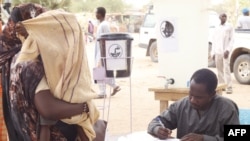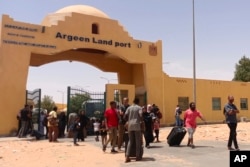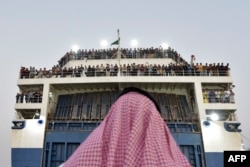Sudan’s warring military factions agreed Tuesday to a new, weeklong cease-fire starting Thursday, South Sudan announced, although more airstrikes and shooting in the Khartoum region continued to shatter the latest short-term truce.
South Sudanese President Salva Kiir stressed the importance of a longer truce and the naming of envoys to peace talks, to which both sides agreed.
But the eventual results of the May 4-11 cease-fire deal between Sudanese army chief General Abdel Fattah Burhan and the paramilitary Rapid Support Forces’ General Mohamed Hamdan Dagalo was unclear because of the extensive violations that undermined previous truce agreements that ran from 24 to 72 hours.
With fighting now in its third week, the conflict has forced 100,000 people to flee Sudan for safety and is creating a refugee crisis in neighboring impoverished countries, the United Nations said.
Egyptian President Abdel Fattah el-Sissi said his government would support talks in Sudan between the rival factions but also was "being careful about not interfering in their domestic matters."
"The entire region could be affected," he said in an interview Tuesday with a Japanese newspaper, as an envoy from Sudan's army chief, met with Egyptian officials in Cairo.
The U.N. World Food Program said Monday it was resuming work in the safer parts of Sudan after a pause earlier in the conflict after some aid workers were killed.
The agency said in a statement on Monday that distribution of food is expected to commence in the states of Gedaref, Gezira, Kassala and White Nile in the coming days to provide life-saving assistance.
"The risk is that this is not just going to be a Sudan crisis, it's going to be a regional crisis," said Michael Dunford, the aid agency’s East Africa director.
Even though they agreed to a new cease-fire, the commanders of the army and RSF, who had shared power as part of an internationally backed transition toward free elections and civilian government, have shown no definitive sign of backing down.
But neither seems able to secure a quick victory. That has raised the specter of a prolonged conflict that could draw in other countries.
The United Nations migration agency said in Geneva that at least 334,000 people have been internally displaced in Sudan since deadly fighting broke out last month between two military factions, in addition to the 100,000 who have fled the country.
The new figures come a day after the U.N. refugee agency made an ominous prediction that the fighting could cause more than 800,000 people to flee the northeastern African country.
Raouf Mazou, the deputy head of the office of the U.N. High Commissioner for Refugees, said Monday that the agency was preparing for 815,000 people to flee Sudan into seven neighboring countries. He said that included 580,000 Sudanese along with foreign refugees now living in Sudan.
UNHCR head Filippo Grandi said in a tweet Monday that the agency hopes its planning figures turn out to be too high, but he said that “if violence doesn’t stop, we will see more people forced to flee Sudan seeking safety.”
Fighting between Sudanese government forces and the paramilitary Rapid Support Forces continued Tuesday despite the extension of yet another cease-fire agreement. Sudan’s health ministry says more than 500 people reportedly have been killed and more than 4,000 wounded since the fighting began on April 15 after relations between the two factions fell apart. The two generals leading the warring parties were allies in Sudan’s transitional government after a 2021 coup.
A string of temporary truces has been widely ignored by both sides. The cease-fires were established by the two warring factions to allow people safe passage and to open a means for the country to receive humanitarian aid. However, while fighting has abated in some parts of the capital, heavy fighting has continued elsewhere. Each side has blamed the other for the infractions.
The top U.N. official in Sudan, Volker Perthes, told The Associated Press on Monday that Sudan's warring generals have agreed to send representatives — potentially to Saudi Arabia — for negotiations.
The Sudanese ambassador to the United States, Mohamed Abdalla Idris, told VOA he hopes the cease-fire will eventually lead to meaningful long-term peace talks.
He said, “a cease-fire, truce, is a two-way traffic,” and said peace can only be realized if all parties respect the terms of any deal.
U.N. Secretary-General Antonio Guterres dispatched U.N. humanitarian chief Martin Griffiths to Sudan to assess the situation there.
The fighting in Sudan has forced foreign governments to pull their citizens from the country.
Russia’s military announced Tuesday that more than 200 people will be evacuated on four military transports.
Hundreds of Americans reached the eastern city of Port Sudan this weekend, watched over by U.S. military drones. Saudi officials said Monday that a U.S. Navy ship took more than 300 evacuees from Port Sudan to the Saudi port of Jeddah.
The U.S. State Department said Monday that three U.S. convoys evacuated more than 700 people since Friday and more than 1,000 U.S. citizens have been evacuated since the violence started.
Michael Atit in Khartoum; Margaret Besheer at the United Nations; Anthony LaBruto; John Tanza, Nike Ching at the State Department contributed to this report. Some information came from The Associated Press, Reuters and Agence France-Presse.












